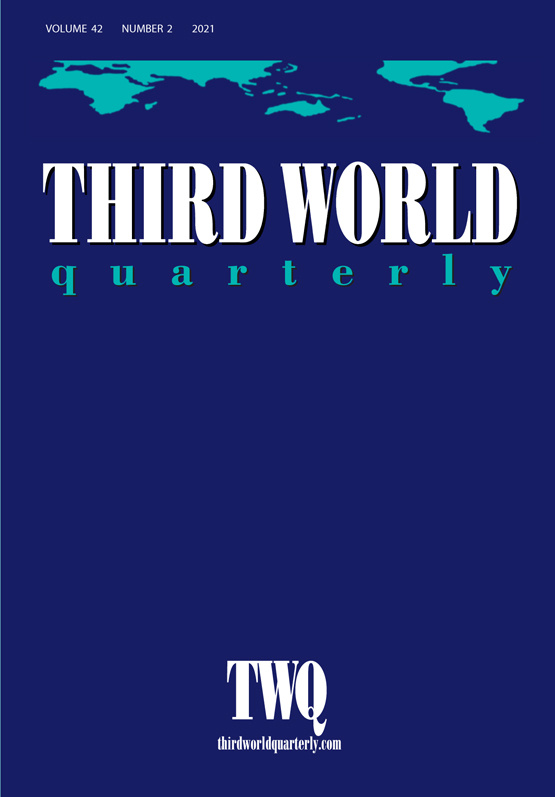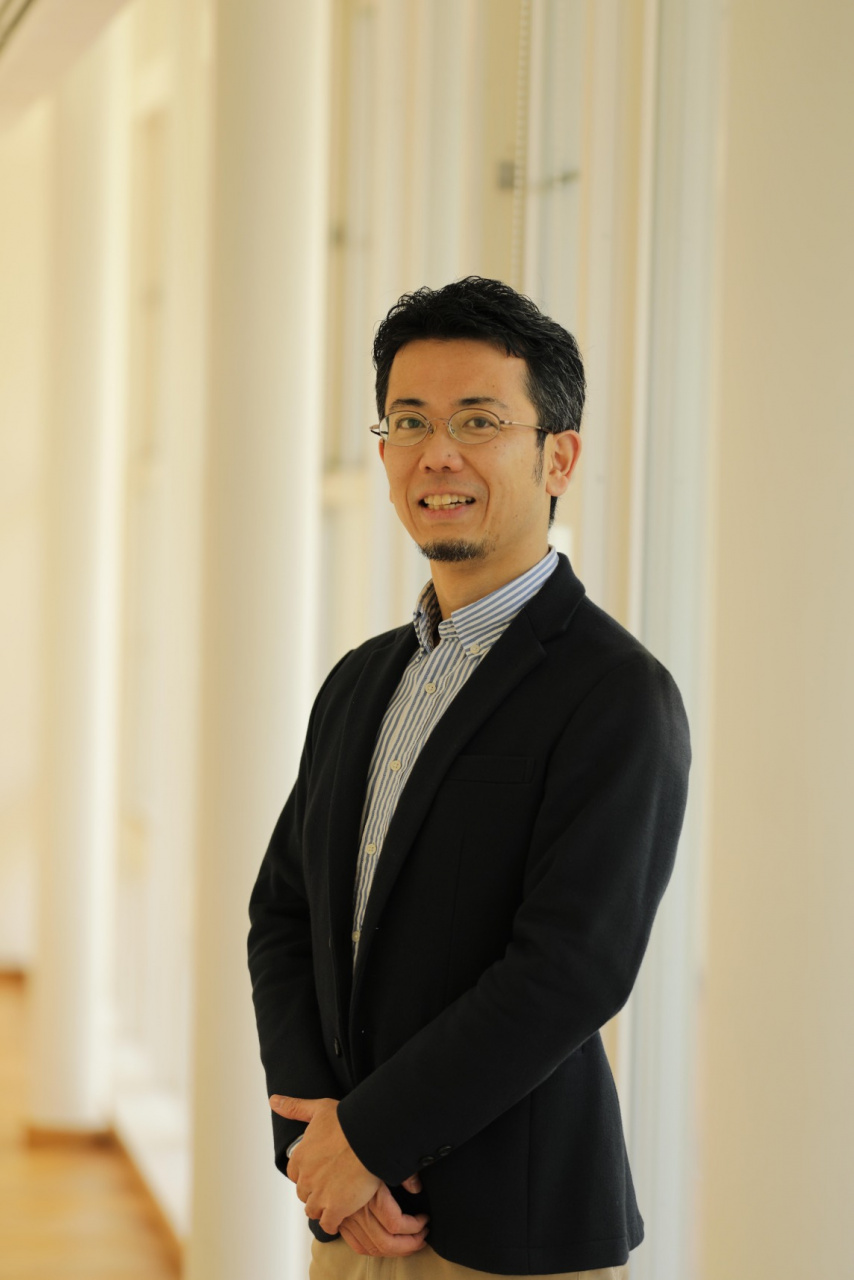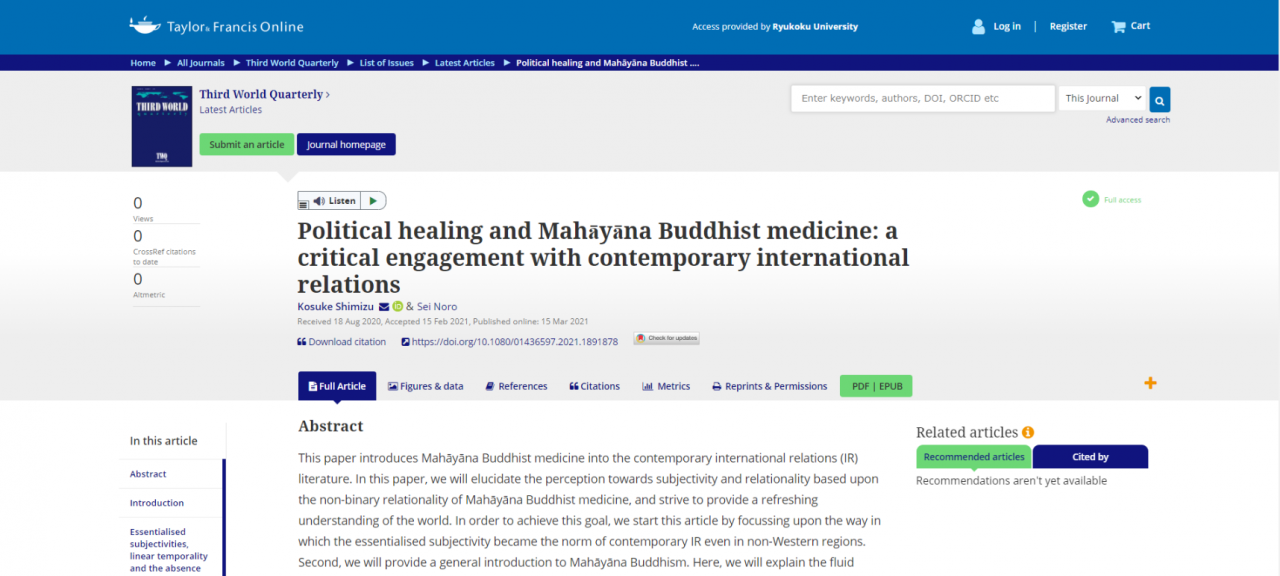2021.03.12
国際学部 清水耕介教授と文学部 野呂 靖准教授の仏教SDGs関連の2本目の共著論文がThird World Quarterly誌に掲載【研究部・国際学部・文学部】

国際学部 清水耕介教授
清水 耕介教授(国際学部 グローバルスタディーズ学科)と野呂 靖准教授(文学部 仏教学科)の共著論文 “Political Healing and Mahāyāna Buddhist Medicine”(政治的な癒しと大乗仏教医学)が「Third World Quarterly」誌に掲載されました。
これは、先日お知らせしました両名のSDGs関連の共著論文 “An East Asian approach to temporality, subjectivity and ethics: bringing Mahāyāna Buddhist ontological ethics of Nikon into international relations”(時性、主体性および倫理への東アジア的アプローチ:大乗仏教の存在論的倫理・而今の国際関係への展開)/(Cambridge Review of International Affairs誌に掲載)に続く、2本目の仏教SDGs関連のQ2ジャーナルです。
****************************************************************************************************
Third World Quarterly誌は、1979年から発行されているWOS収録の国際的なQ2ジャーナルです。編集委員にはノーム・チョムスキー教授も参加するなど、批判的な学術誌として国際関係、地域研究、開発学などの分野でよく知られています。
****************************************************************************************************
この論文では、大乗仏教医学を現代の国際関係(IR)文献に適用し考察しています。本稿では、大乗仏教医学のノンバイナリーな関係性に基づく、主体性と関係性に対する認識を解明し、世界への新たなる知見をもたらすことを目指しています。この目標を達成するために、非西洋地域においてさえ、本質化された主体性が現代IRの標準になったことに、本稿ではまず焦点を当てています。
次に、大乗仏教の概要について述べています。ここでは、この哲学的伝統の特徴である、流動的な主体性、特にその関係性、および一時性に関係する仮定について述べています。
第三に、私たちはこの思想の実践である、大乗仏教医学に焦点を移しています。大乗仏教医学は、自律性と独立性から生じる恐怖と不安に囚われている人々に実際の医療方法を提供しているという意味で、現代のコロニアル/ポストコロニアルな理論に対して非常に示唆的であると考察しています。最後に、大乗仏教医学のIRへの応用可能性を検討するために、特に時間性、関係性、倫理といった現代IRでの論点について、あらためて述べています。
【論文掲載情報】
●掲載元:
Third World Quarterly
https://www.tandfonline.com/doi/full/10.1080/01436597.2021.1891878
●論文名:
“Political Healing and Mahāyāna Buddhist Medicine”
(政治的な癒しと大乗仏教医学)
●著者名:
国際学部グローバルスタディーズ学科 清水耕介 教授
文学部仏教学科 野呂靖 准教授
【Information】
●Journal Title:
Third World Quarterly
https://www.tandfonline.com/doi/full/10.1080/01436597.2021.1891878
●Research Article
Political Healing and Mahāyāna Buddhist Medicine
●Author names:
Kosuke Shimizu(Department of Global Studies, Ryukoku University)
Sei, Noro(Department of Buddhist Studies, Ryukoku University)
●Abstract:
This paper introduces Mahāyāna Buddhist medicine to the contemporary IR literature. In this paper, we will elucidate the perception towards subjectivity and relationality based upon the non-binary relationality of Mahāyāna Buddhist medicine, and strive to provide a refreshing understanding of the world. In order to achieve this goal, we start this article by focusing upon the way in that the essentialised subjectivity became the norm of contemporary IR even in non-Western regions. Second, we will provide a general introduction to Mahāyāna Buddhism. Here, we will explain the fluid subjectivity of this particular philosophical tradition, particularly its assumptions of subjectivity, relationality, and temporality. Third, we will shift our focus to a practical application of this line of thought, Mahāyāna Buddhist medicine. We argue that Mahāyāna Buddhist medicine is extremely suggestive to contemporary colonial/postcolonial relations in a sense that it provides a practical way to cure those who are suffering full of fear and anxiety generated by the assumptions of autonomy and independence. Last, we will return to the discourses of IR, a particularly recent discussion on temporality, relationality and ethics in order to consider the possible contributions of Mahāyāna Buddhist medicine to IR.


